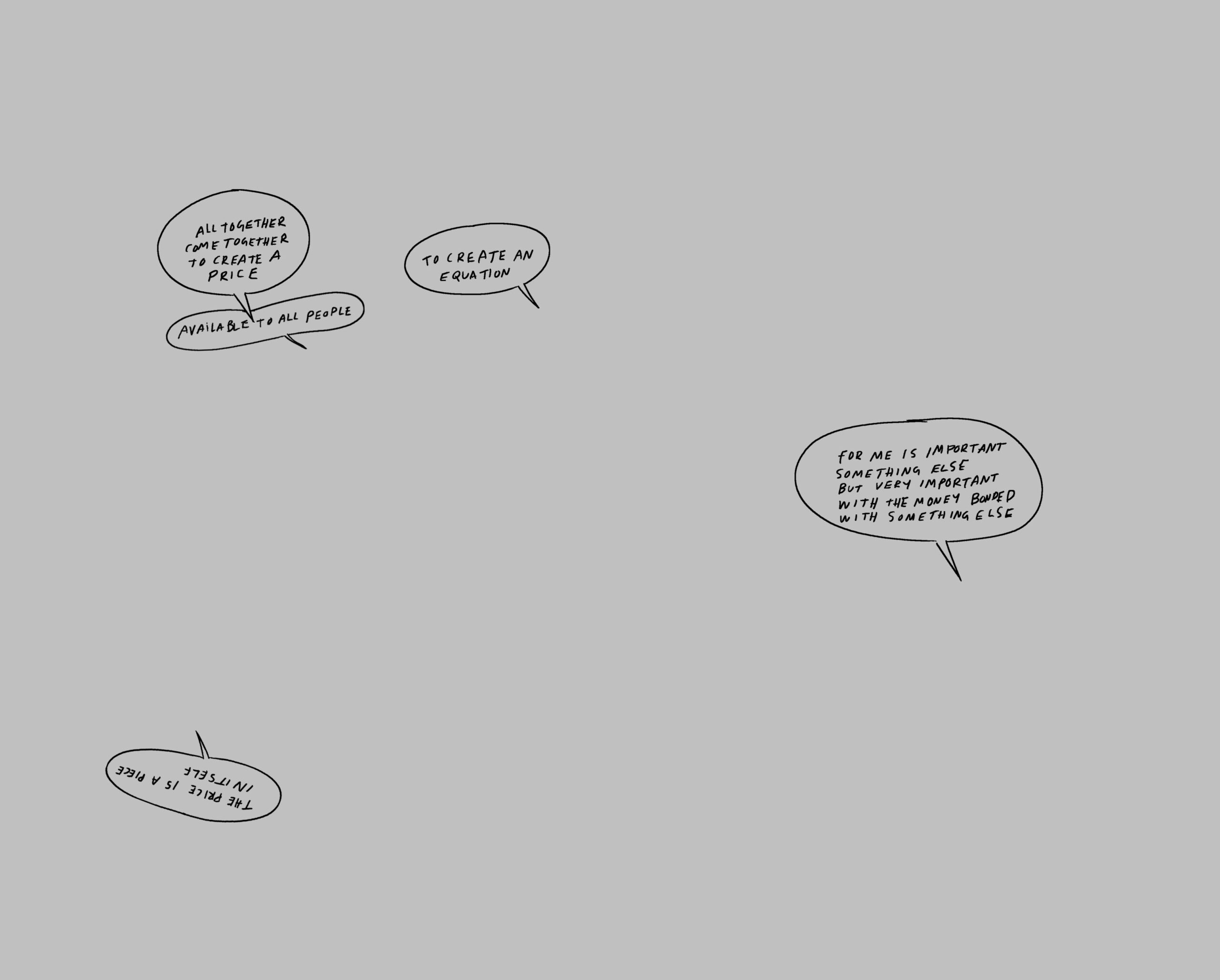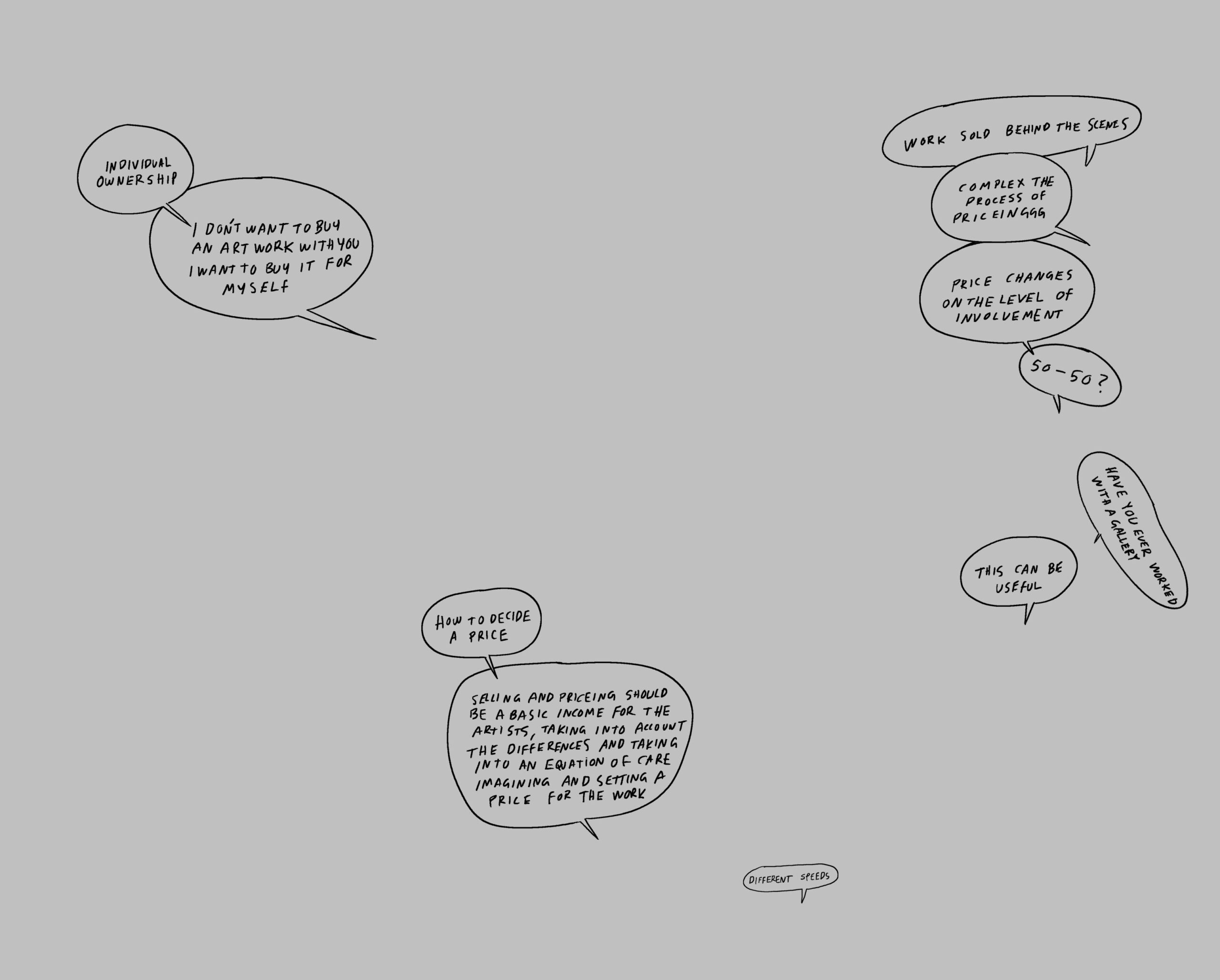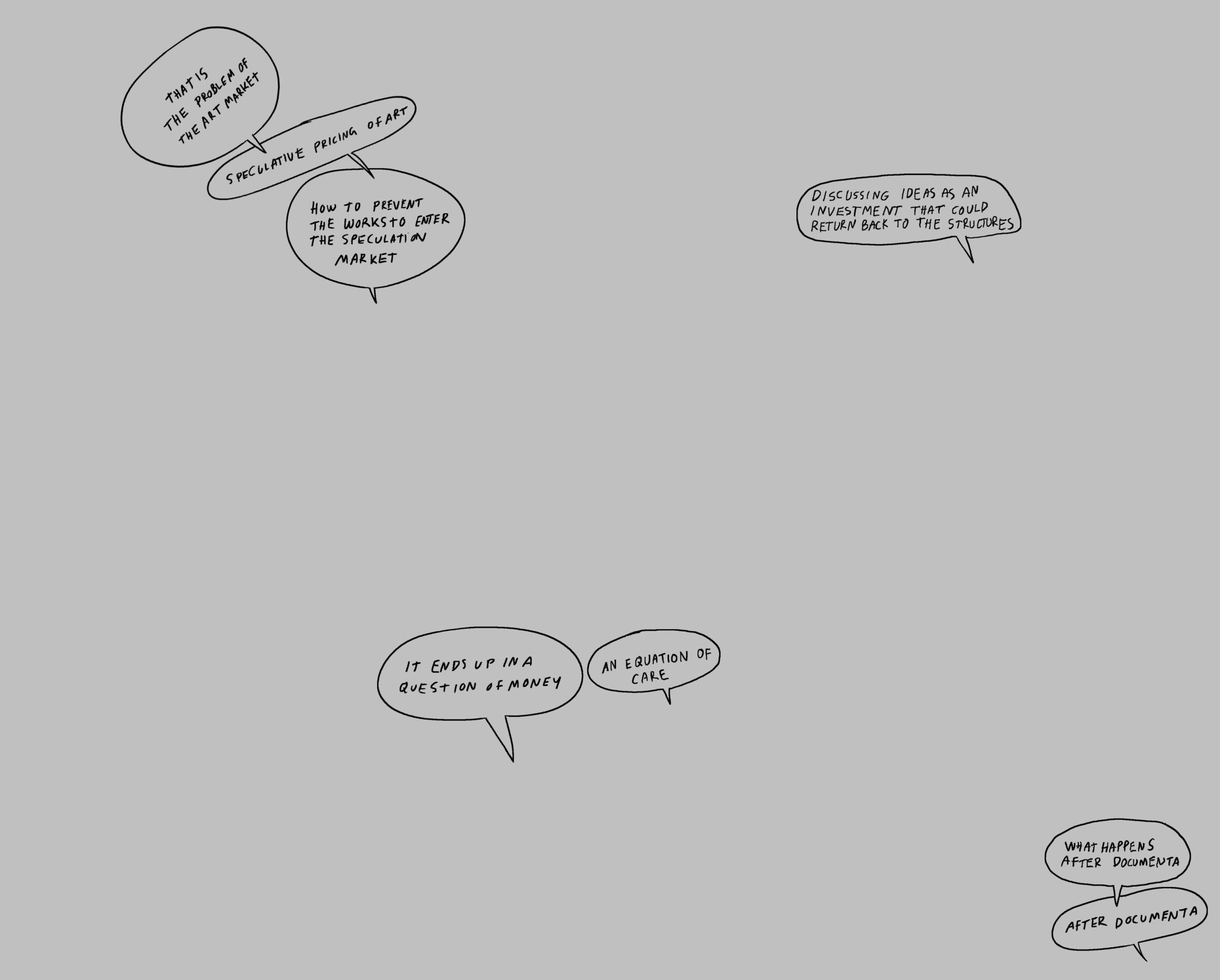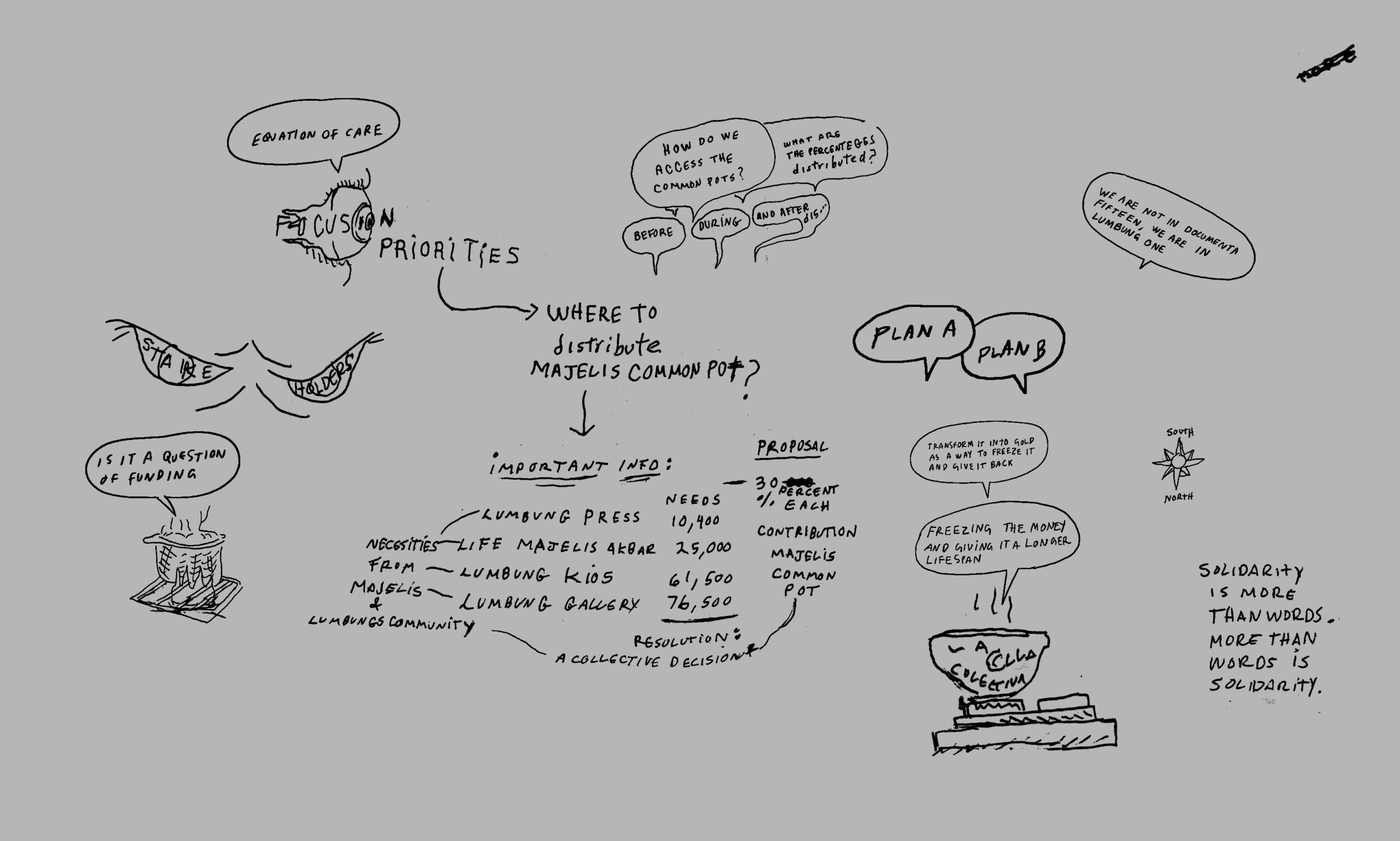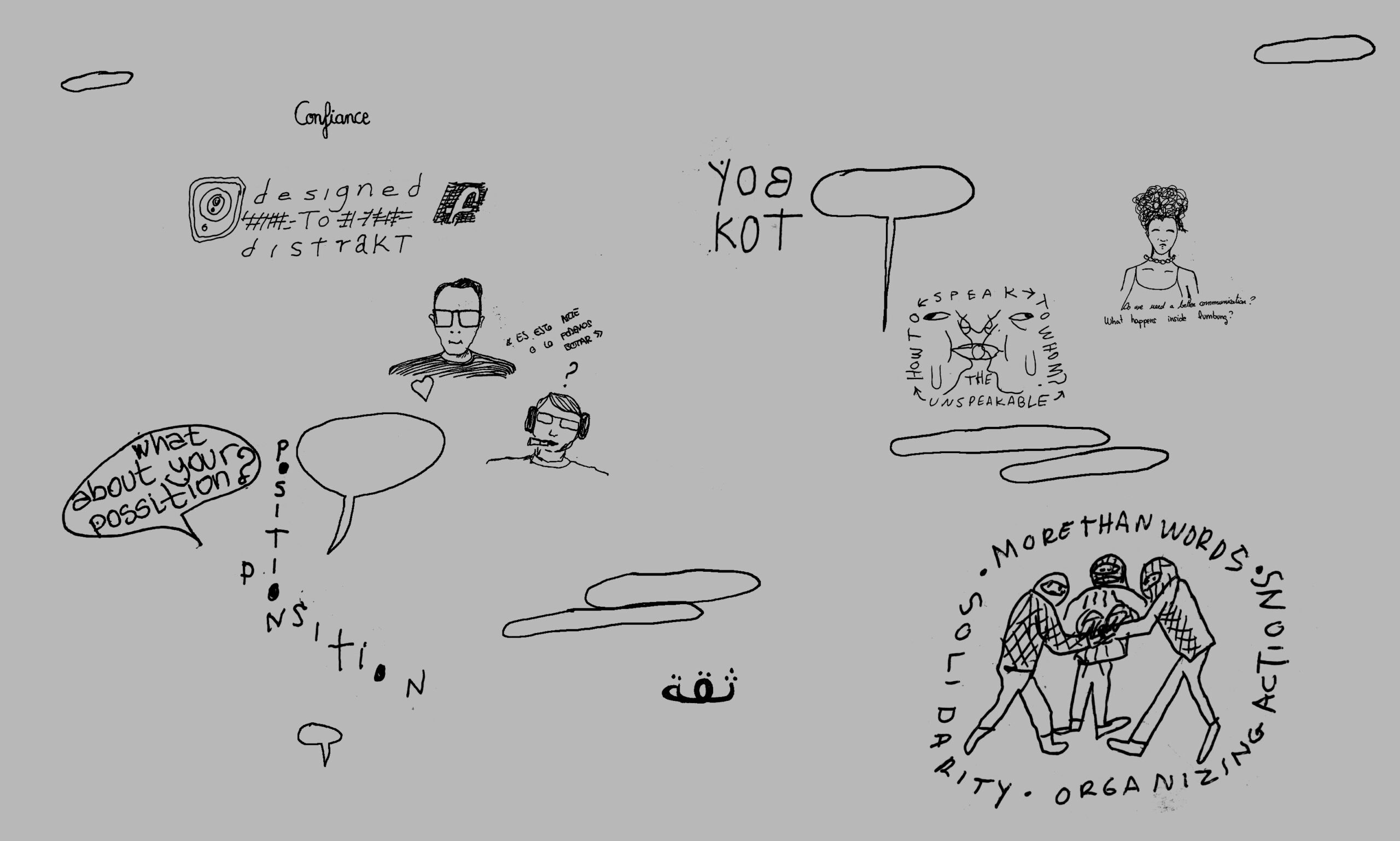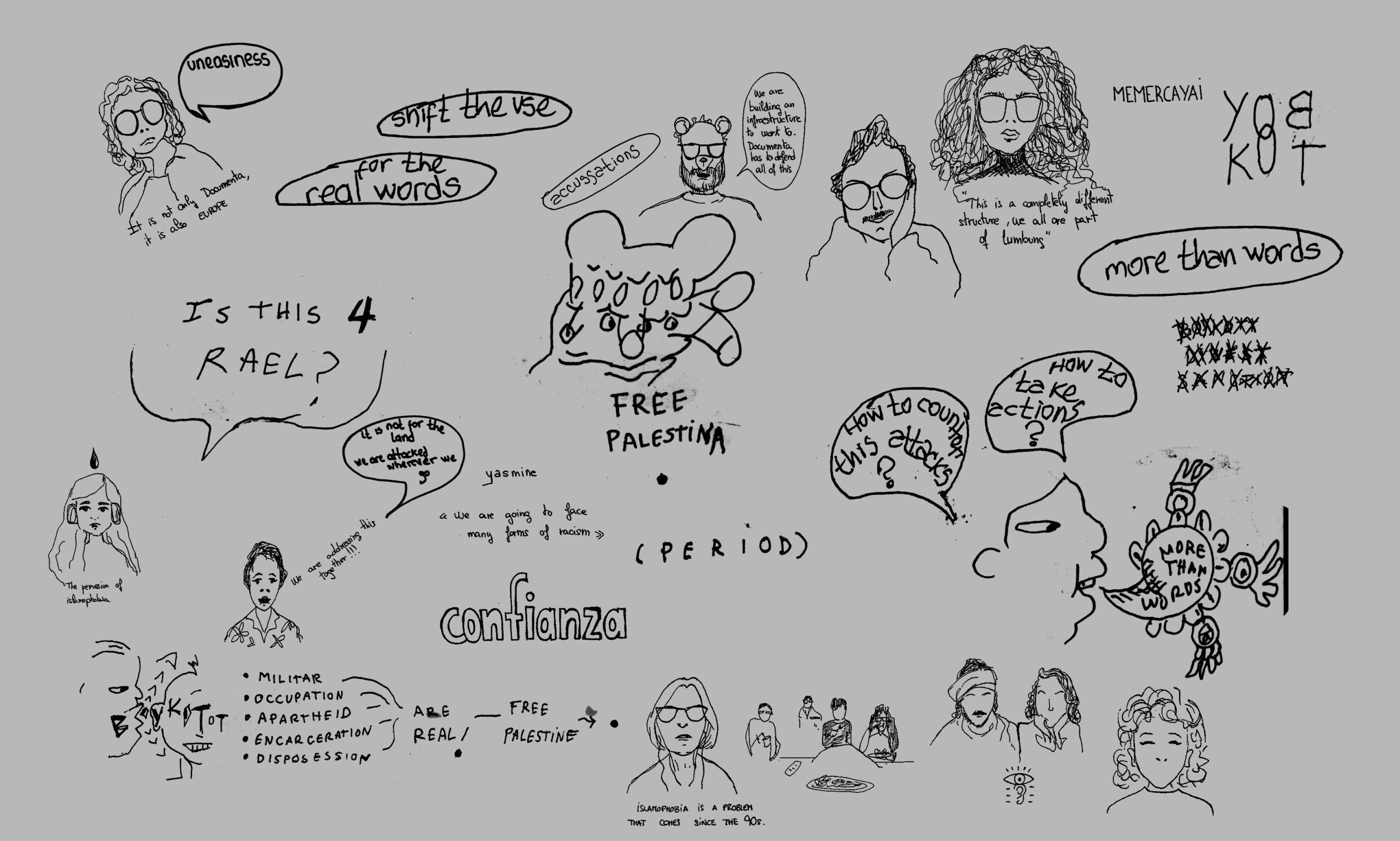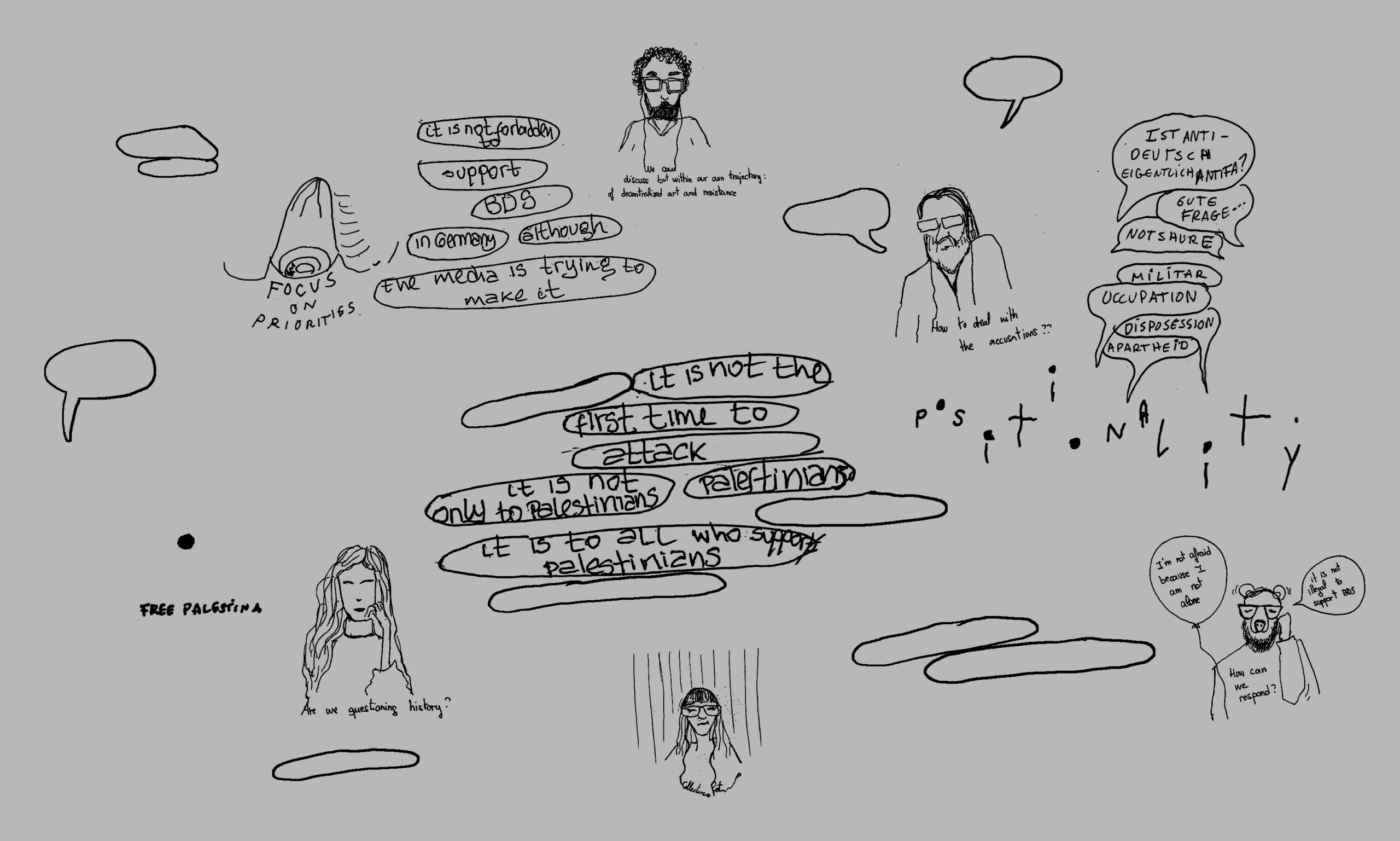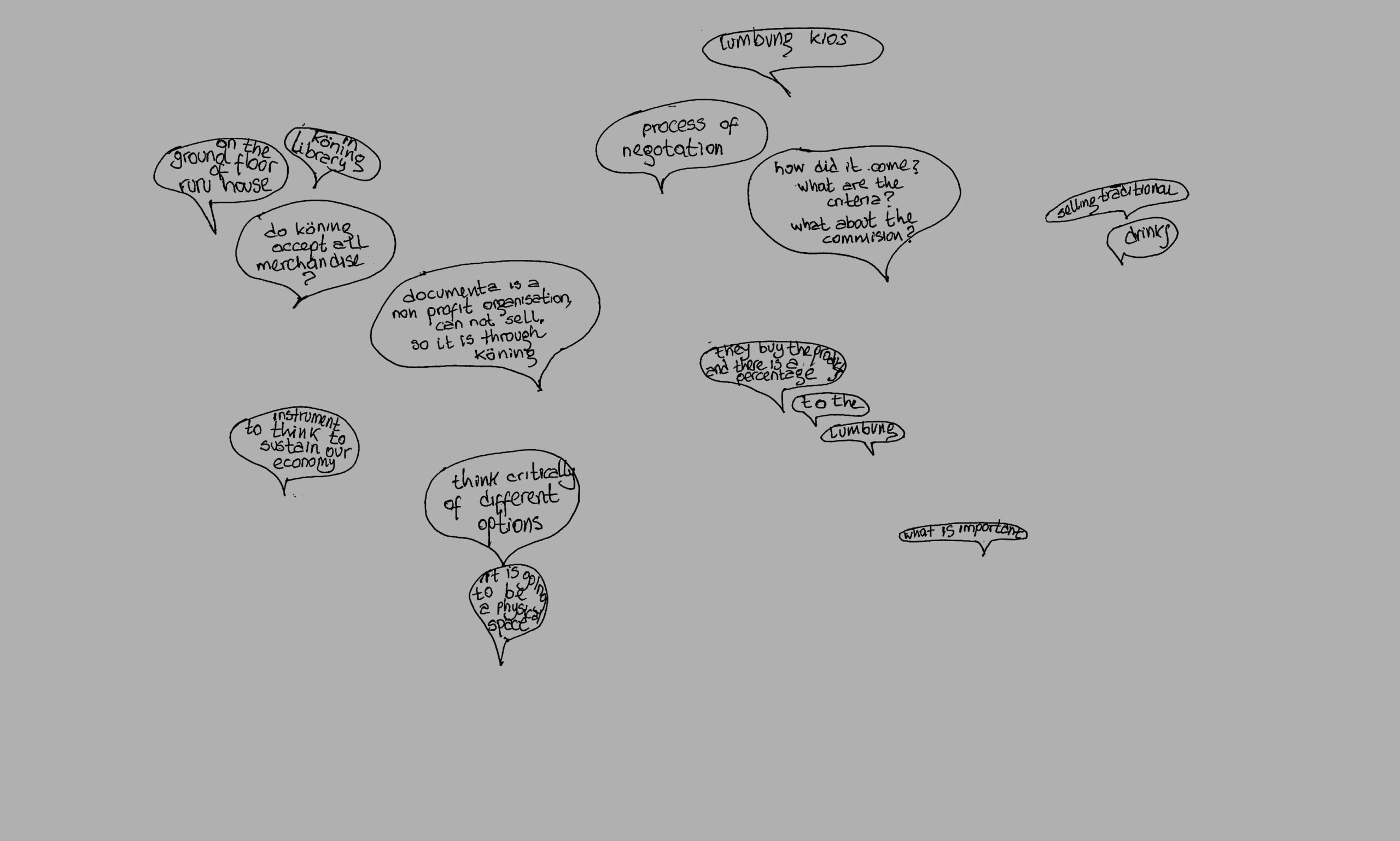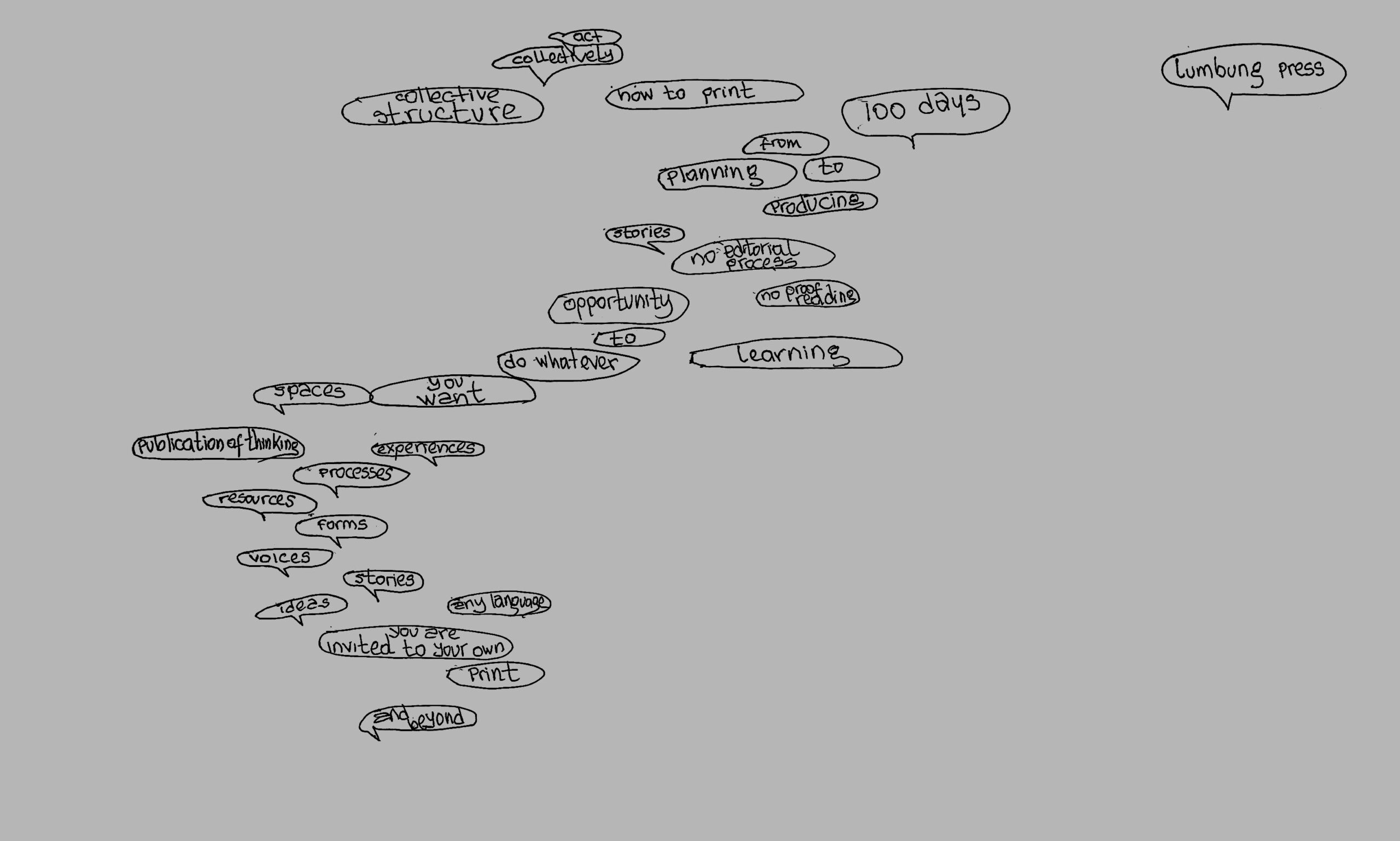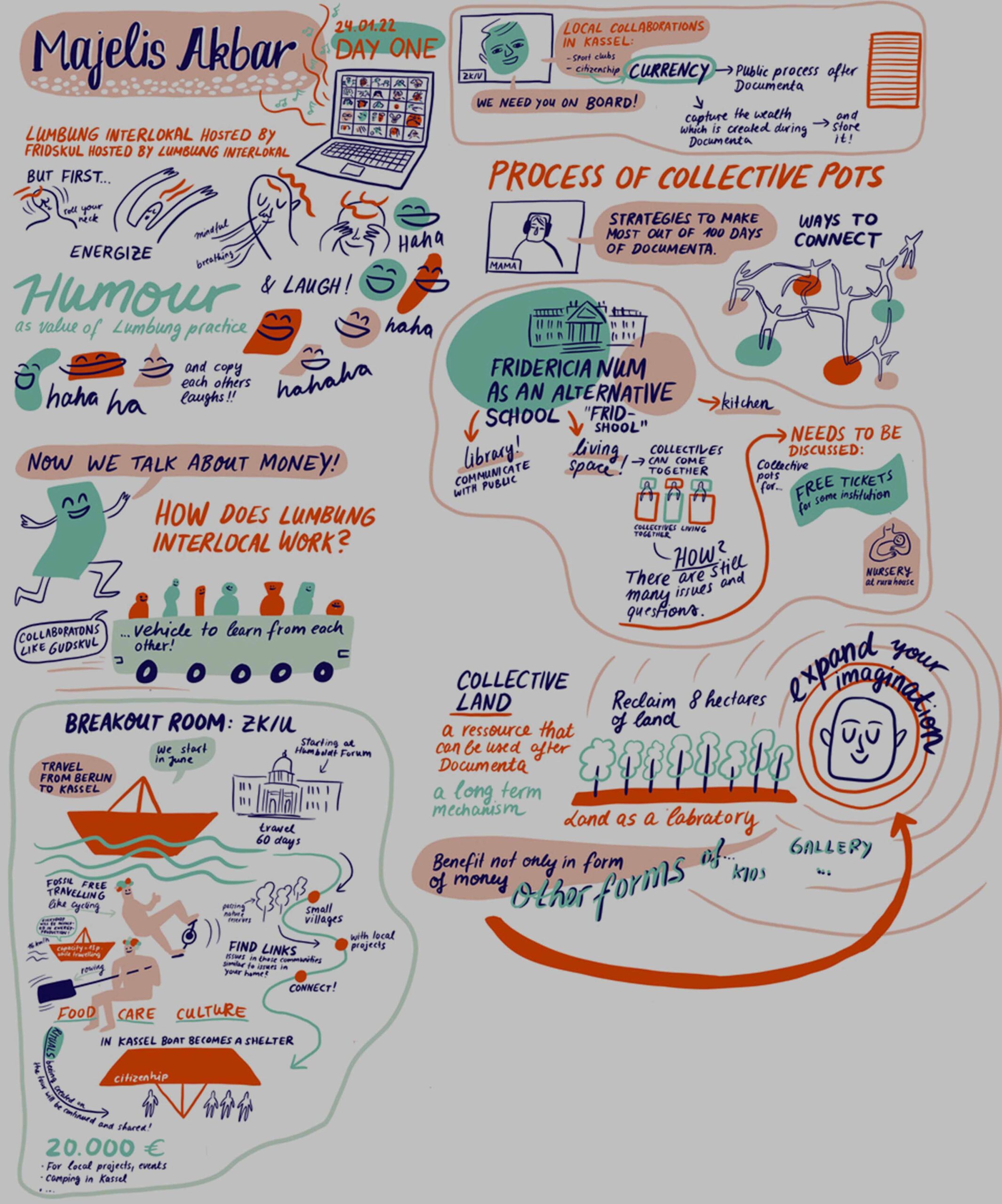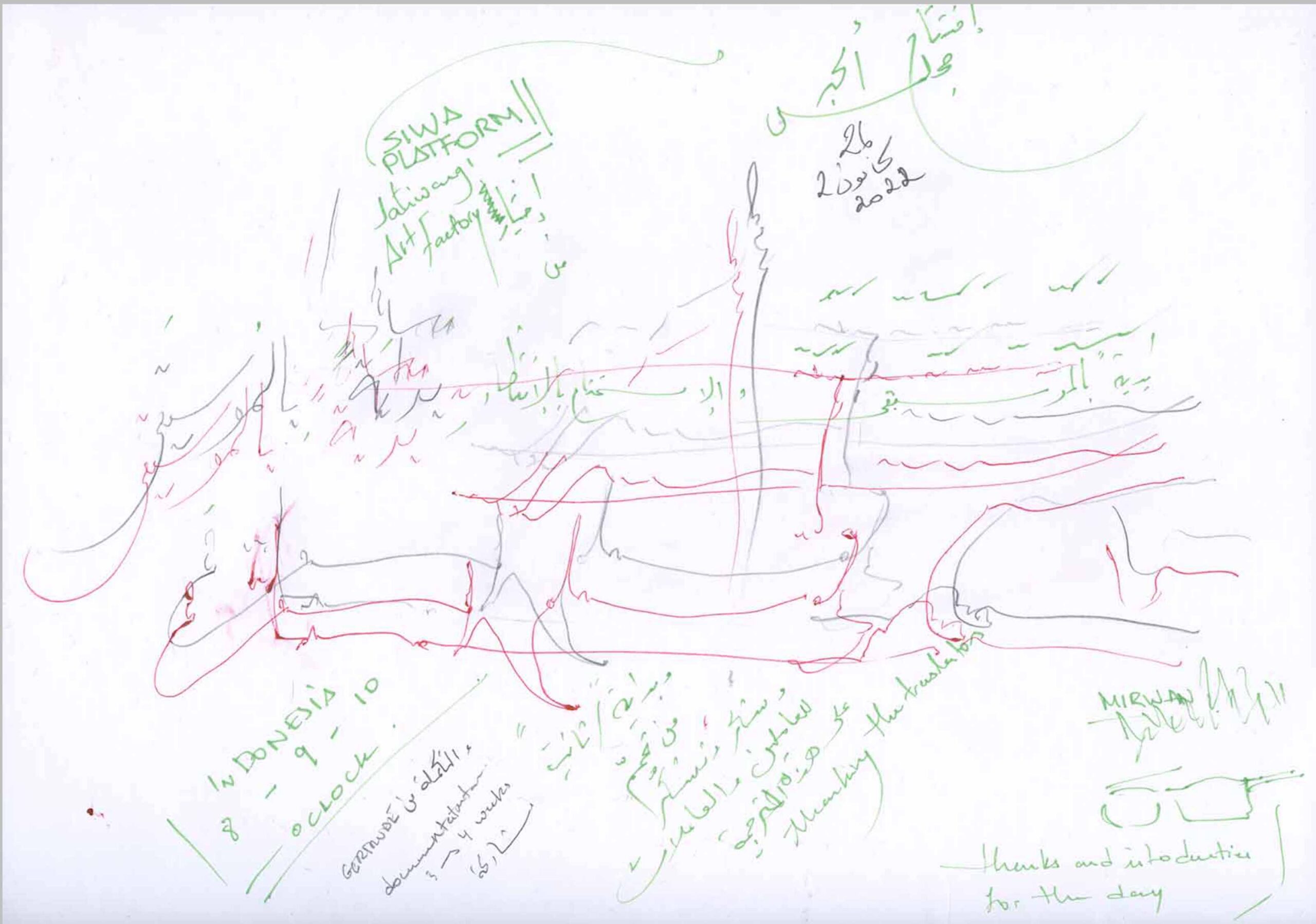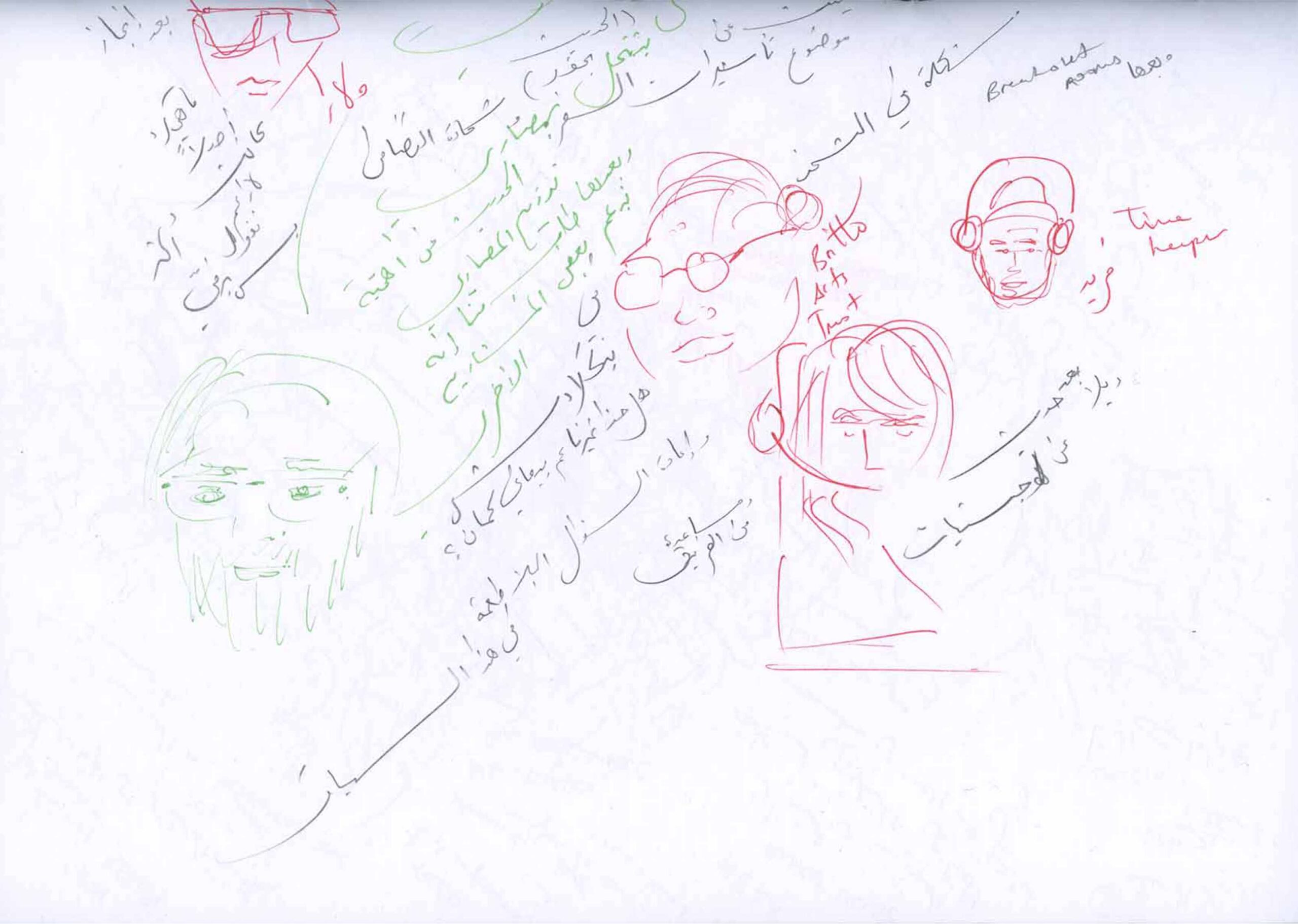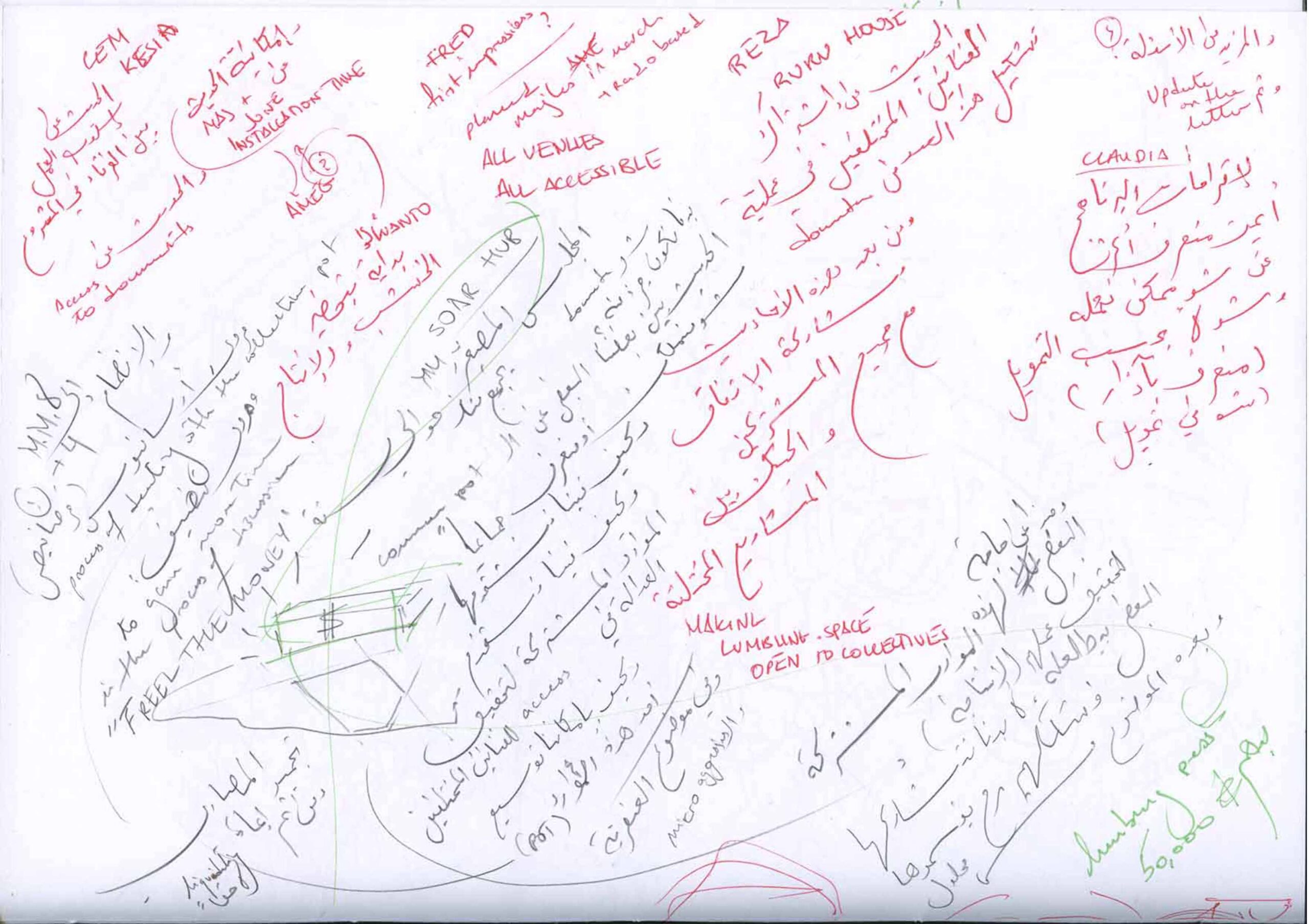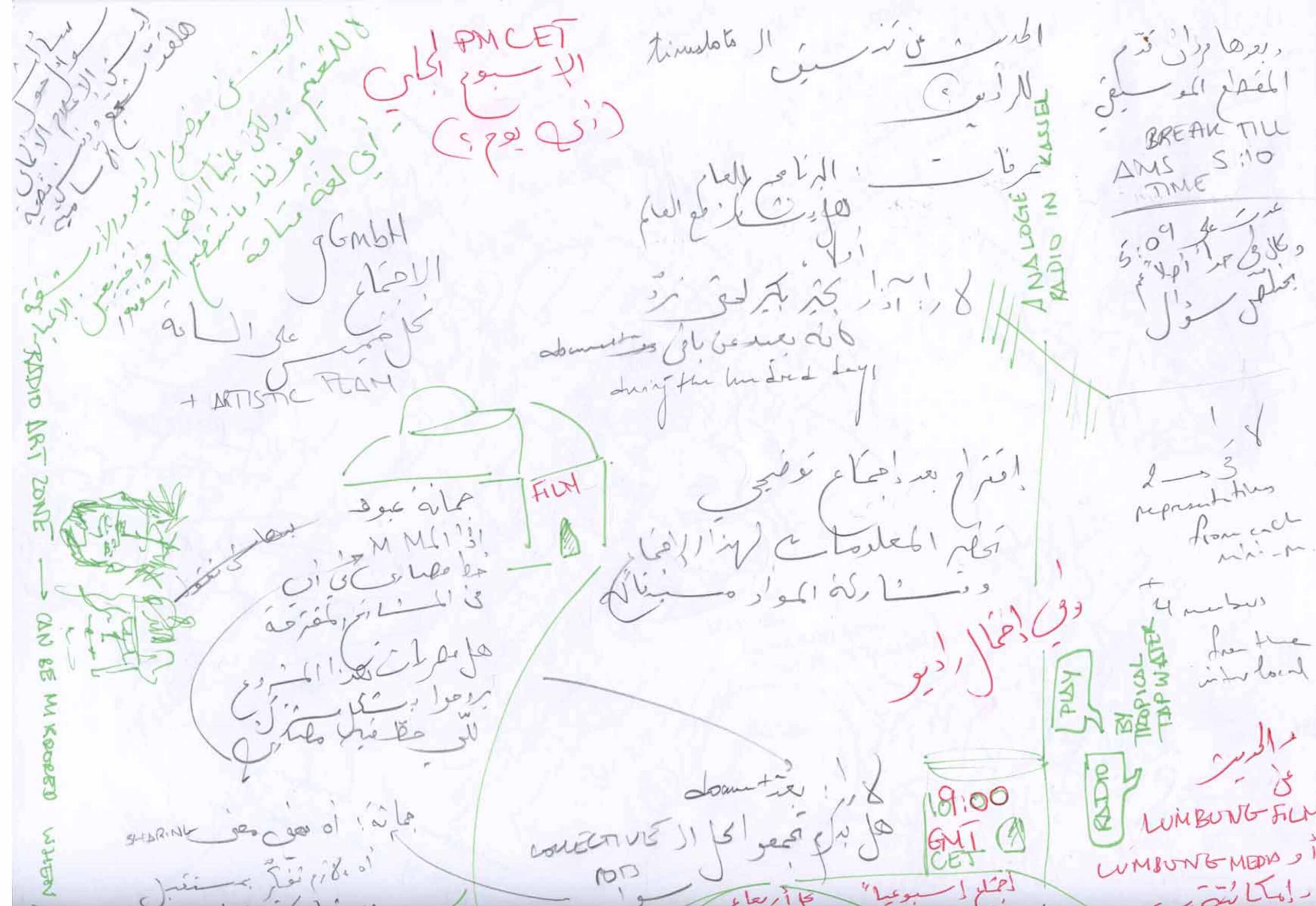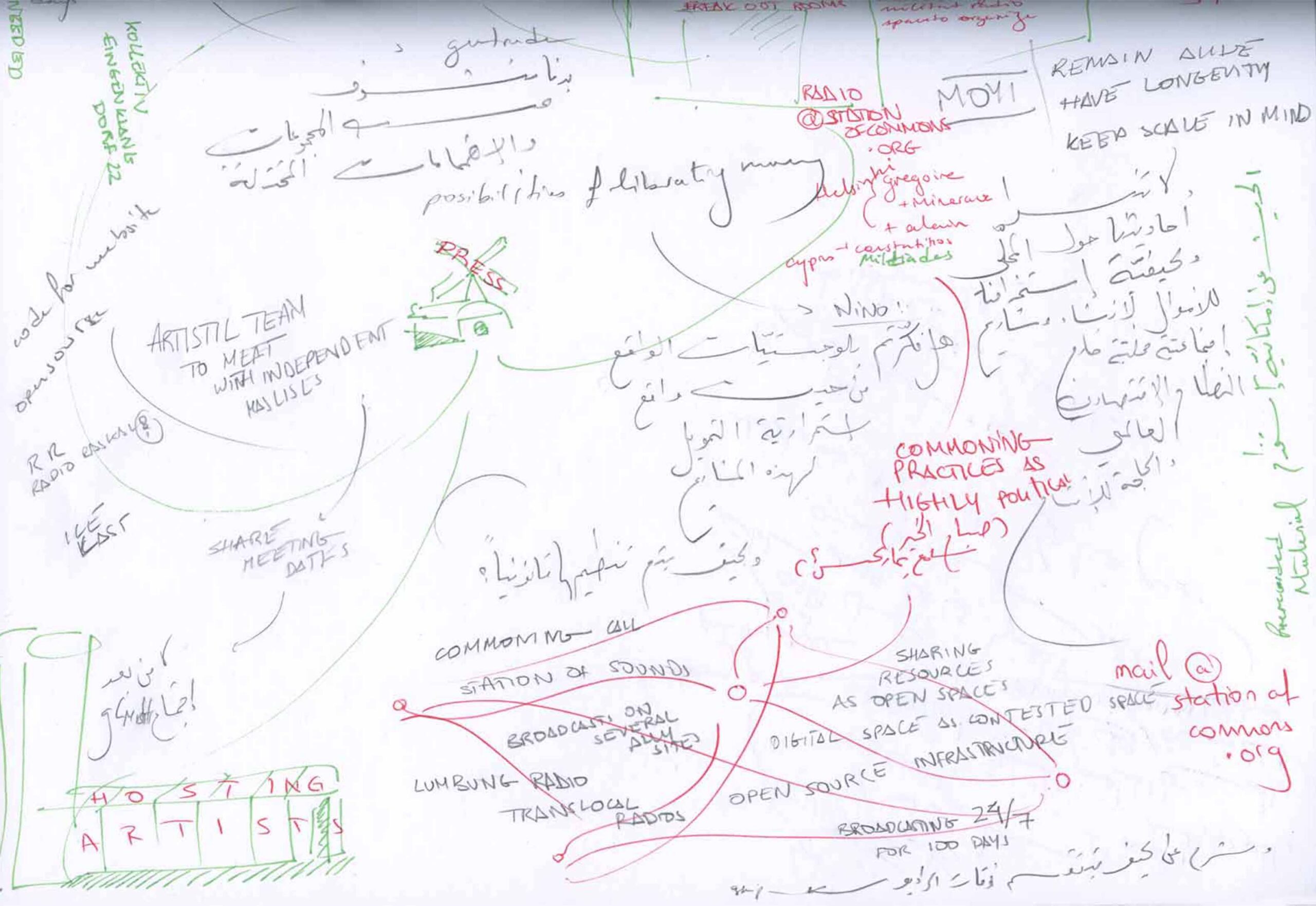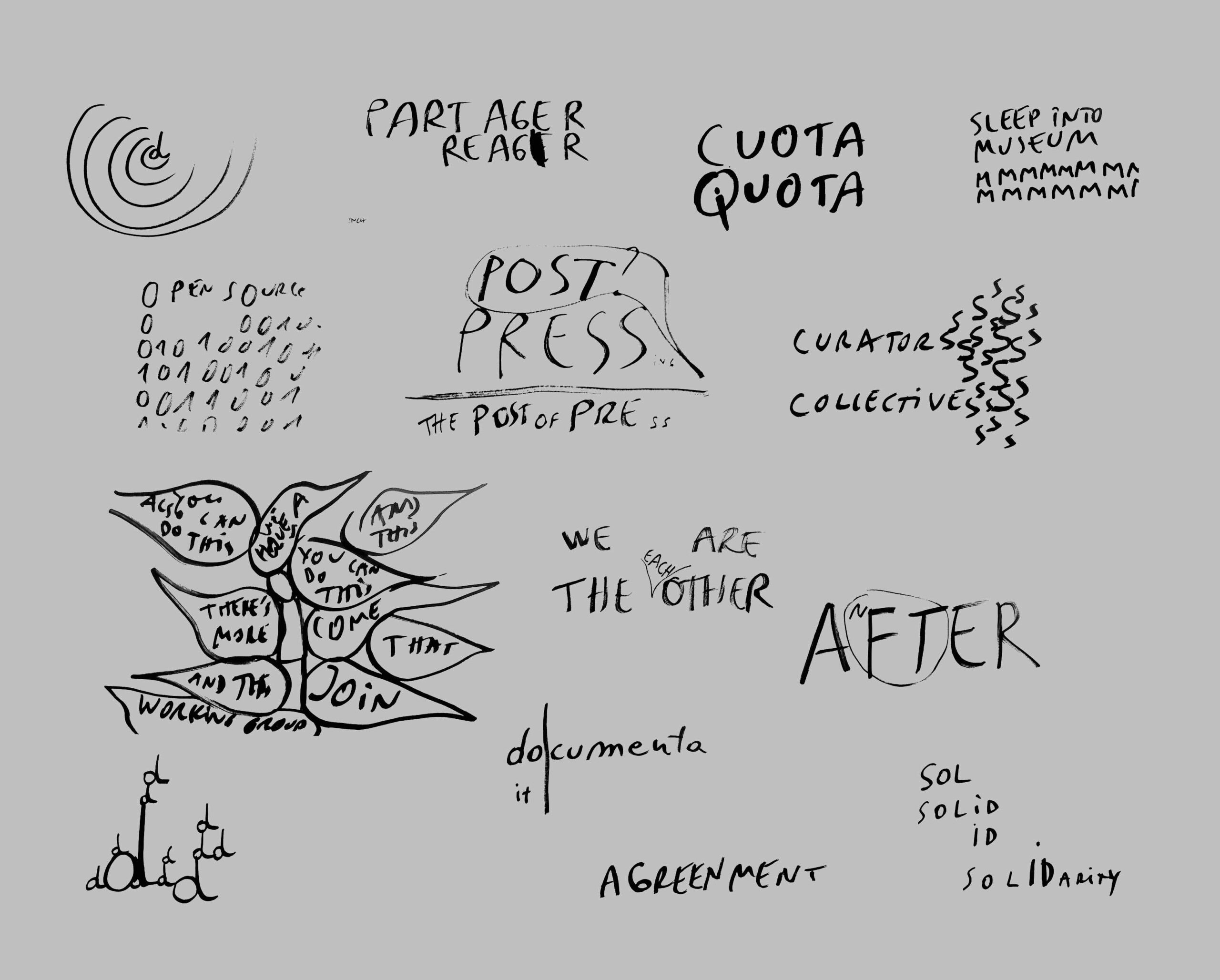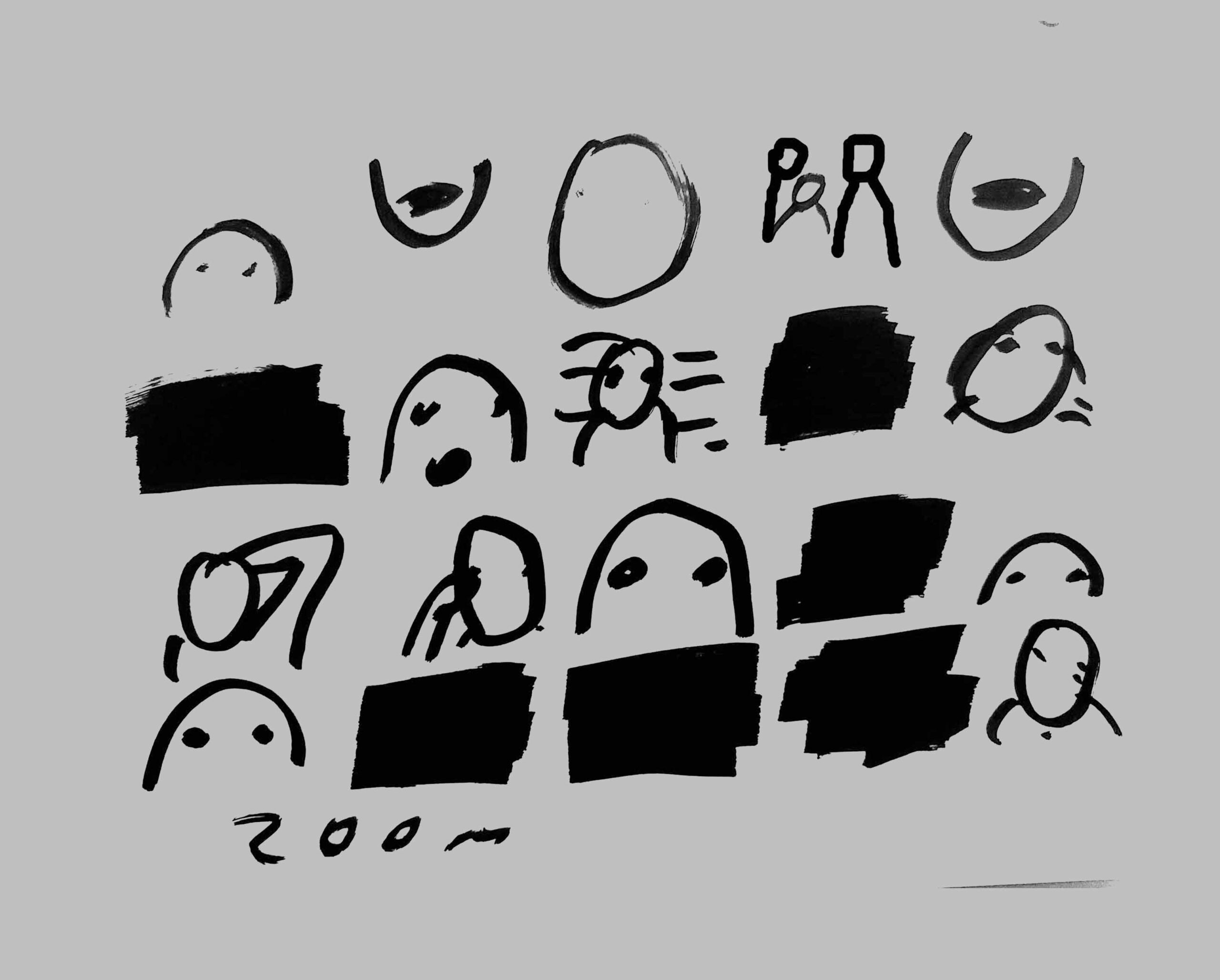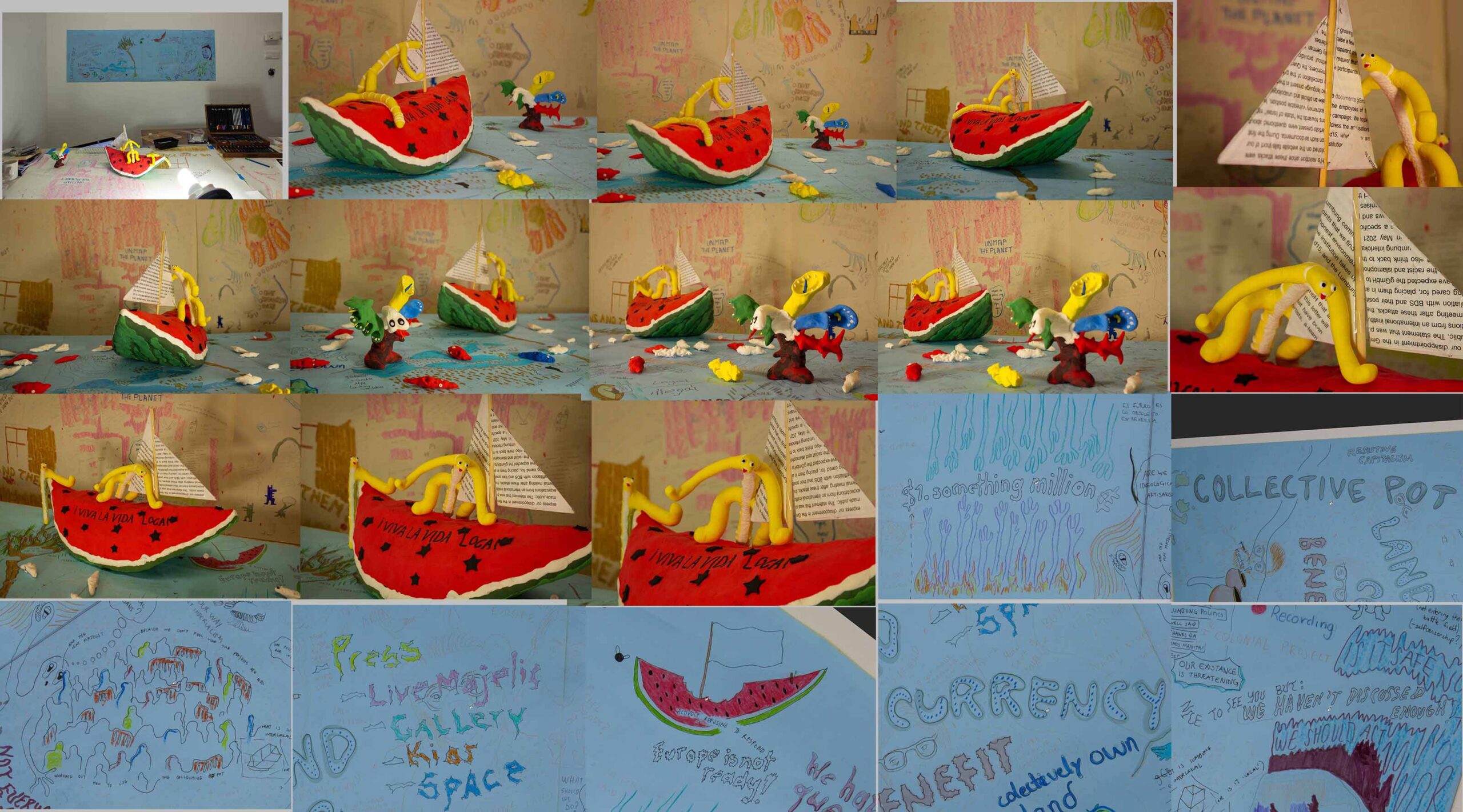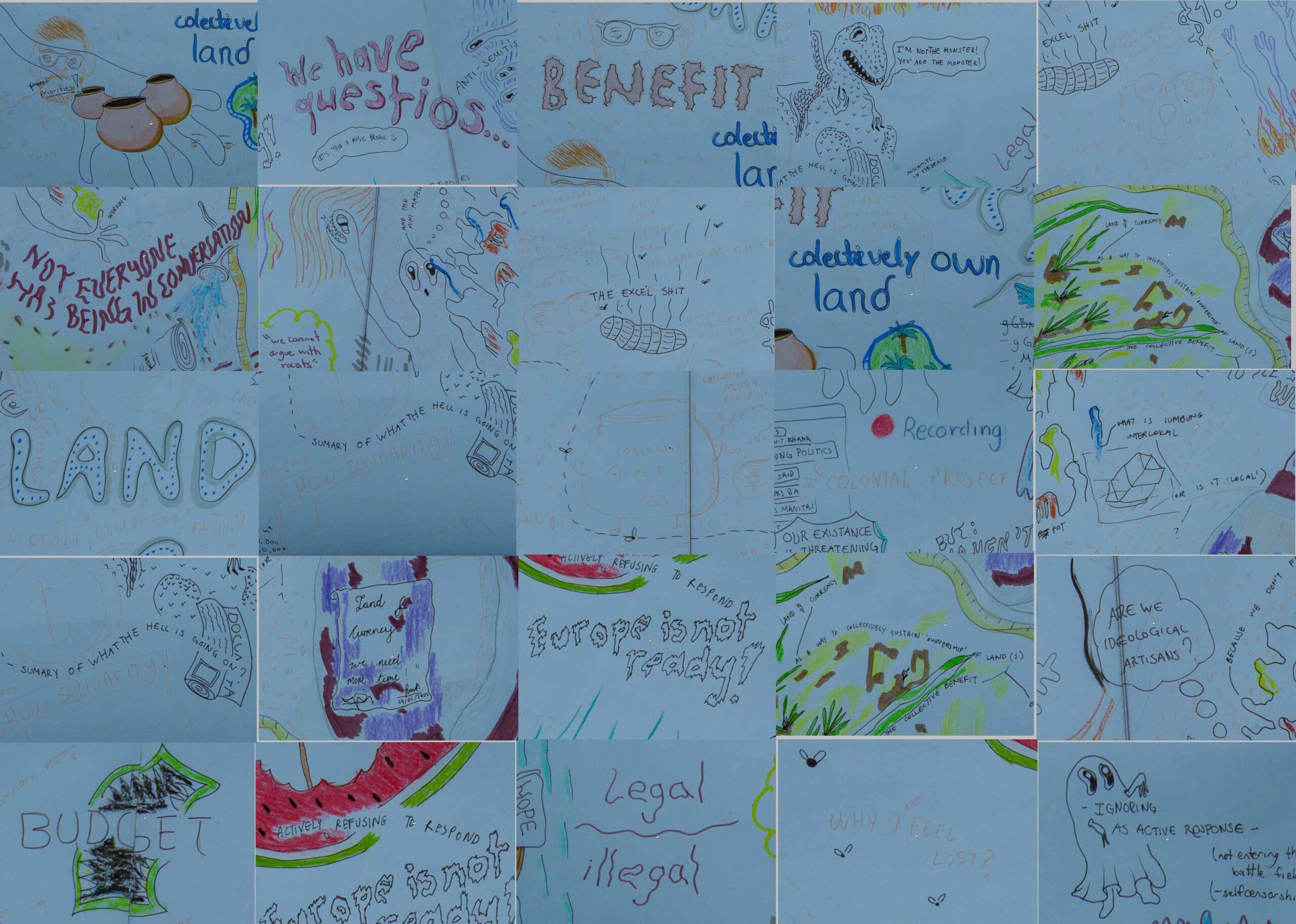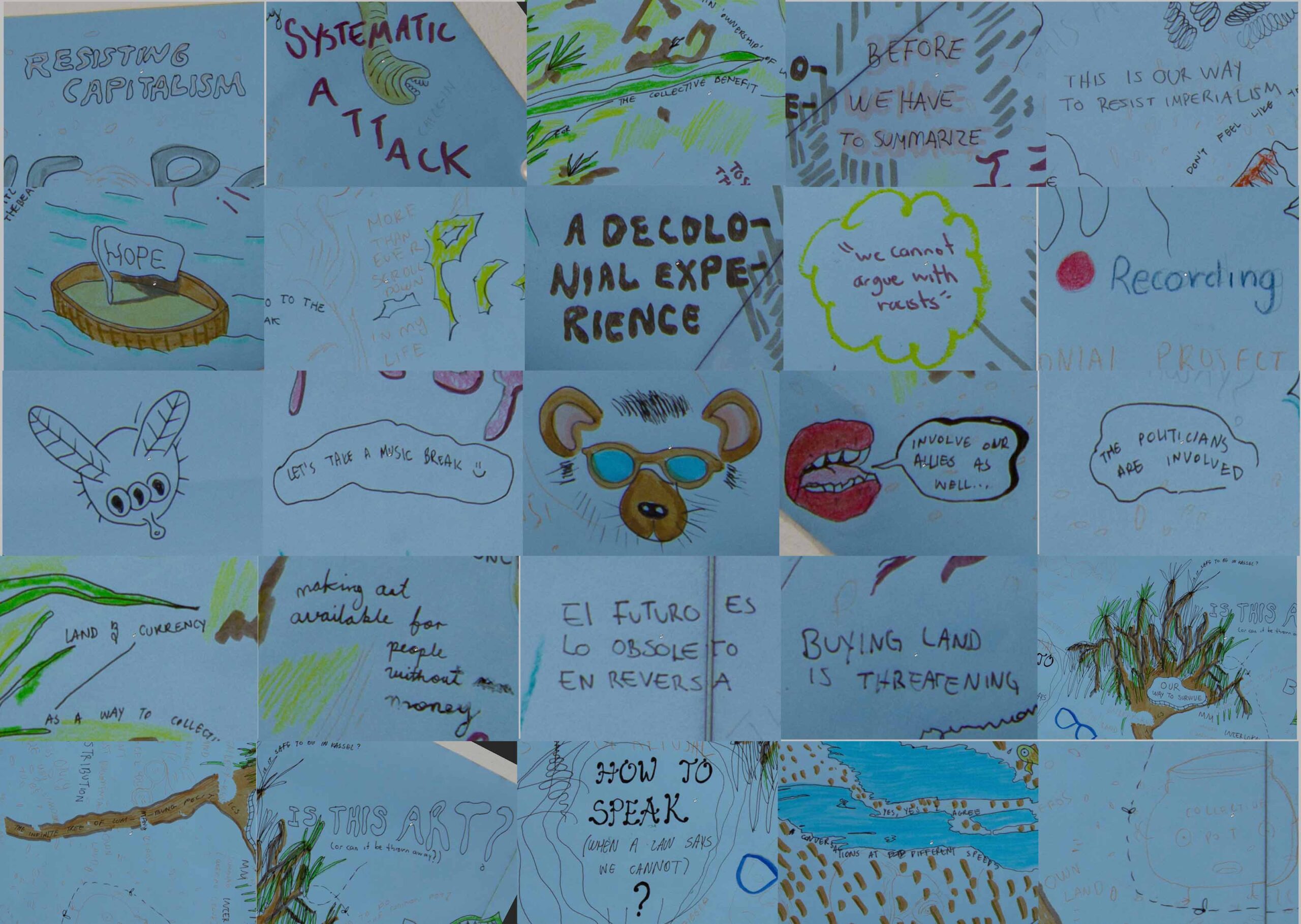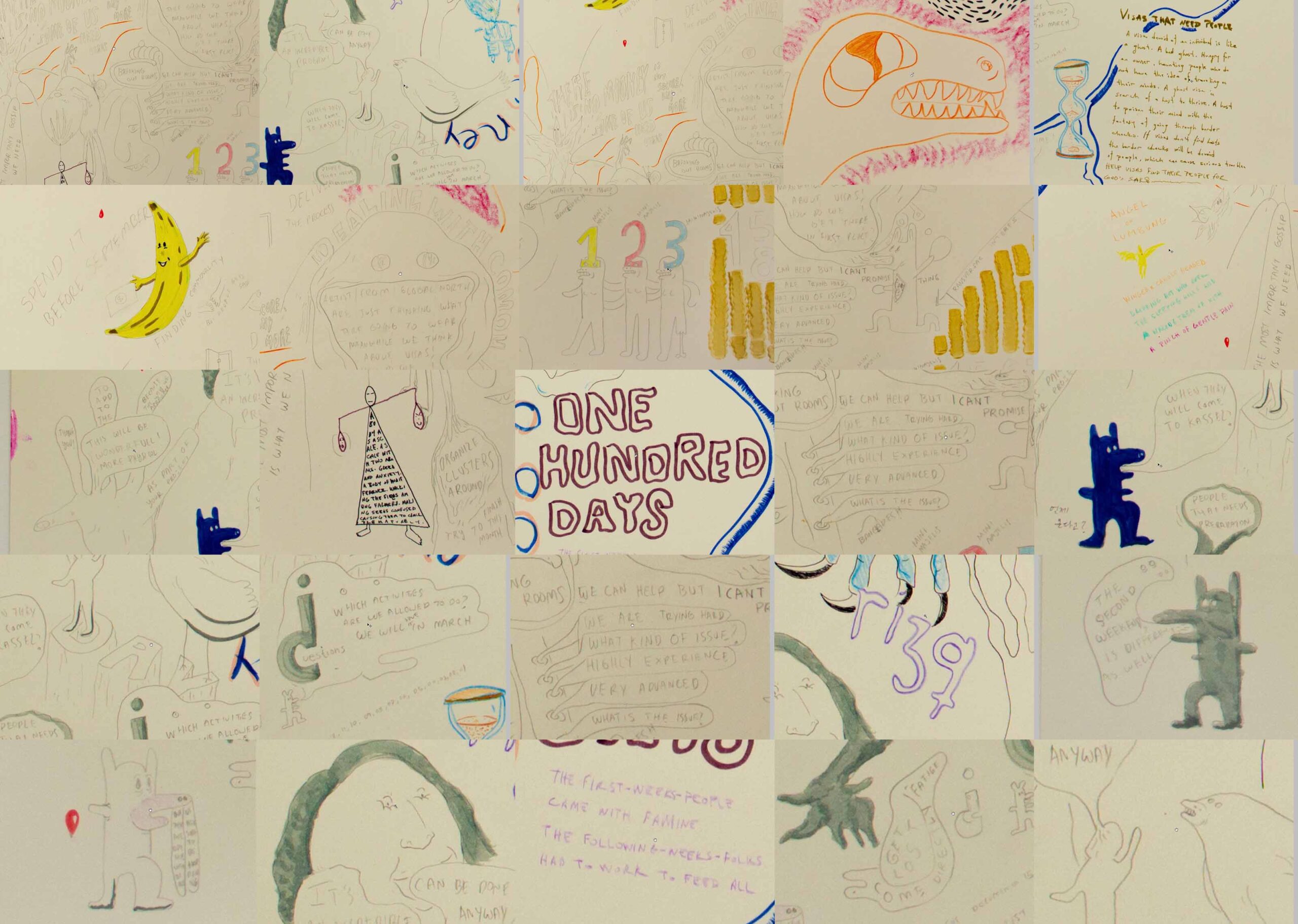

Issue #3 - February 2022
Uneasiness. More than words.
This is the harvest of the lumbtamtambung 3 Majelis Akbar that happened
from January 25 to 27, 2022. The second “big assembly” gathered the artistic team,
curators, majelis, production team and friends. We all attended to share, discuss, listen to proposals, projects and processes that are going on in the preparation of documentafifteen.
The virtual meeting was fueled by expectation as well as an energetic enthusiasm. It was also affected by the racist accusations which appeared in a local Kassel blog (and then viciously replicated by burgoise media) against Palestinian participation and pro-Palestinian friends
How can we begin to make sense of all the fog in front of our eyes, of all the noise, of all the bad smell and taste that attacks leave in our bodies?
Solidarity is a neural aspect of the spirit and artistic practices that indeed cross documenta fifteen, lumbungs and our ecosystems. During the Majelis Akbar solidarity was woven throughout a collective space which generated a discussion as well as a letter to documenta GMBH, addressing the institution to give account of its responsability, not only towards the German history (from the current bsd banns going back to holocaust during WWII and even before WWI…) but also towards the palestinian community working today for documenta fifteen in the present.
Can the institution guarantee safety to the participants?
What can an institution such as documenta fifteen promote as a frame of solidarity, and in what terms? Isn´t it also an important question to raise, not only in institutional language, but rather in communitarian argot, how do we express solidarity amongst people? Is reflection also an action? What kind of collective actions may we organize to make solidarity a constant practice? Is there also space for imagining-reflecting upon the openess of solidarity? What are the stories in our contexts of solidarity as actions? Have we experienced solidarity?
In the virtual space sometimes we forget our especificities:
contextual, territorial, spatial, corporeal. The majority of the people that connected to Majelis Akbar where in complete different time zones yet simultaneously connected, We could all feel in our bodies the uneasiness provoked not only of being in front of a screen by also how the before mentioned external attacks against our growing lumbung community make us to be in alert mode.
How may we open up for more internal conversations inside our groups, ecosystems, communities, to approach ourselves with care and vulnerability? We all face such big problematics as racism, clasism, gender violence in our own personal histories and contexts.
How do we become stronger and yet remain vulnerable, open up to critique therefore recogniztion and transformation?
Uneasiness has appeared around the discussions on how to access, and how to use money of the collective pot$.
Mini Majelis is the group of documenta fifteen artists gathered to virutally discuss around the access and use of the collective pot$. The collective pot$ are determined by the artistic team of documenta fifteen, and is a proposal to take economical resources from the institution and share it with the artists and their local ecosystems. The collective pot$ consist of 20,000 euros for each Majelis. These pot$ are proposed to be used during the 100 days. Some of the Majelis think that it is a very important opportunity to self organize the pot$. How to think of them as possibility to save money for further collaborations beyond documenta fifteen time frame? Restrictions and rules of how to “liberate” money from the GMBH have brought not only stress, but also extralabour for the participants of the Mini Majelis. We found ourselves in the need to invent or recall imaginative strategies to make this acce$s possible. A not so smooth feeling of uneasiness regarding how to access money is something we need to elaborate around in a personal and collective series of reflections:
how to translate commitment into actions?
We, as Mini Majelis, in our bi weekly meetings went deep into reflecting, organizing and getting to know each other (to think what we could do together). During these last Majelis Akbar, artistic team presented the Lumbung projects (such as Gallery, Kios, Space and Press) in the need of more budget. We were directly asked as Mini Majelis if a percentage of our destined common pot$ could be allocated to support these collective processes (that is important to adress that all the Lumbungs are coming out of the desires of needs of the Majelis as well as from lumbung interlokal community); still it was a an unexpected decision for some in the Majelis Akbar.
How can we build commitment if trust from the institution to the artists and artistic team is not guaranteed? Learning to have trust takes time and trust is not something that is given, it is also practiced, and from that practicing trust is nourished. The value of sharing time is something Mini Majelises have committed to. Time has been used to organize firstly into getting to know each other. The togetherness created inside the virtual spaces and social media channels, including the ones of the lumbung.space, has been crucial for trust to be entangled. We are intensively being mediated, yet we find space to get in touch with each other. Voices sometimes feeling so near, still we also make a structural critique to social media technologies where contact is based on alienation because they are cyphered in capitalistic terms.
Another problematic that produces uneasiness is the idea of money as a fetiche. If we use the idea of “liberation” rethorically to address money, we give it a body, a substance. Taking into account we are living in a world full of prisions, borders and exclusions, the idea of liberating money and not people, animals or earth (as a complex subject) is rather something we need to critically reflect upon.
What are we giving corporeality to? Why do we think money can be liberated?
Money is a translation invented in capitalist world and presented as needed to exchange the value of our labour. We all know the trap is in the concept of (use-exchange) value(s). Domination today is so complex. This is by no means a space to go deep into the idea of money in late capitalist society and relationship with labour, time, value, reproduction of everyday life. In the context of documenta fifteen, we – the Mini Majelises- have done already the labour of working/organizing/producing labour%value.
Don´t we have the (laboral) right to access the common pot$?
The Language we use should go back into the recogniztion by GMBH and all of us as participants/workers, of the labours we have already done insofar. Liberating money is not only a paradox but a false proposition. Money should be accessed to (accesing money as a social right), and prisioners should be liberated (as a pollitical goal of the struggles).
Eventhough most of the working force and conversations during the Majelis Akbar were directed to discuss the lumbung projects as well as working paralelly on the letter in solidarity with Palestinan friends-community. There was space in the breakout rooms to discuss and gather around other projects. Party Office proposal to hack the 12 steps recovery programme and revisit it into a “workoholic anonymous” group. It has the intention of doing a bodily critique to how productiveness, explotaition, and general contemporary living conditions make us sick, fragmented, sad, anxious, unaware, and addicted to the present. Capitalistic times makes us very much vulnerable facing Power structures. We try to mirror the 12 steps programme from a responsable yet open approach: recovery process are not easy and are complex. Attempting to detox is always a pun: no one but oneself knows the journey to recovery, we can share our ways but by no means there is a truth or “a way”. Failure and learning are also important part of the AC school process.
Where will the journey of recovery go: every day, 24hrs each day, sobering up, recovering, recognizing, making amends, accepting, healing?
Recovery processes are there to individually impact the collectivities health (for its mutual benefit) and most importantly, the proposal to make a space in documenta fifteen where we attempt to recover from capitalist ethos is not only necesary, but desireable and urgent (with patience we find the times to rest; resting together is never granted; to inhabit and share a space to rest).
We want to acknowledge all the uneasiness, sickness, and opressions, and unveil them as heavy burdens that we all carry and reproduce in our daily lives.
Hopefully, this lumbtamtambung will give us some hints about how to activate questions around solidarity.
how to share common economical resources in the context of lumbungs?
How do we find care and resting strategies accesible?
How do we make them common tools that may help us cope and heal not as an objective-maybe not even a horizon- just step by step, day by day to invest in care for ourselves and for the collectivities, ecosystems we are part of?
Swimming in the waters of recovery is an ongoing and non-linear process. In order to weave trust, we must acknowledge that we are never the same. We do not share the same struggles, yet we are here in the same planet, facing one of the most critical moments of ecocide, war and social desintegtration. We are here, making the effort to stand together recognizing our differences, diversities and multitrajectories.
Uneasiness.More than words is our lumbtamtambung edition of glimpses to continue building together reflections and opening up questions as an act of solidarity.
Acknowledgments
So far all the work here was done by Sally Mizrachi, Maria, Jazael Olguín y Andrés Villalobos all from Arts Collaboratory Network. Also we have the honor to have the work of Sheree Domingo, Sebastián Díaz Morales, Dan Perjovschi and Disarming Design and also Tropical Tap Water collective!!! Thank you very much!!!


